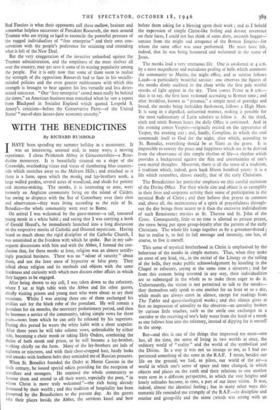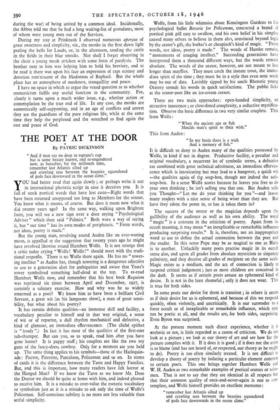WITH THE BENEDICTINES
By RICHARD RUMBOLD
IHAVE been spending my summer holiday in a monastery. It was an interesting, unusual and, in many ways, a moving experience. I chose Prinknash Abbey in Gloucestershire—a Bene- dictine monastery. It is beautifully situated on a slope of the Cotswolds, overlooking vistas and vistas of slumbering blue country- side which stretches away to the Malvern Hills ; and attached to it there is a farm, upon which the monki and lay-brothers work, a large walled garden, several acres of woodland, and sheds for pottery and incense-making. The monks, it is interesting to note, were formerly an Anglican community living on the island of Caldey, but owing to disputes with the See of Canterbury over their rites and observances—they were living according to the rule of St. Benedict—the whole community went over to Rome.
On arrival I was welcomed by the guest-master—a tall, tonsured young monk in a white habit ; and seeing that I was carrying a book of Gerald Heard's, he immediately launched into a long discussion on the respective merits of Catholic and Oriental mysticism. Having heard so much about the rigid discipline of the Catholic Church, I was astonished at the freedom with which he spoke. But in my sub- sequent discussions with him and with the Abbot, I formed the con- clusion that, for these monks at least, religion was an almost terrify- ingly practical business. There was no " odour of sanctity " about them, and not the least trace of hypocrisy or false piety. They talked about religion and its methods and objects with the same frankness and curiosity with which men discuss other affairs in which they happen to be engaged.
After being shown to my cell, I was taken down to the refectory, where I sat at high table with the Abbot and his other guests, chiefly visiting priests and young men who were about to try their vocations. Whilst I was staying there one of them exchanged his civilian suit for the black robe of the postulant. He will remain a postulant for six months, the necessary probationary period, and then he becomes a novice of the community, taking simple vows for three years—vows from which he can only be released by his superiors. During this period he wears the white habit with a short scapular. After three years he will take solemn vows, unbreakable by either side, becoming a choir monk or taking Holy Orders, combining the duties of both monk and priest, or he will become a lay-brother, working chiefly on the farm. Many of the lay-brothers are lads of eighteen or nineteen, and with their close-cropped hair, hardy looks and smocks with leathern belts they reminded me of Russian peasants.
When St. Benedict founded the Order at Monte Cassino in the sixth century, he issued special edicts providing for the reception of travellers and strangers. He enjoined the whole community to honour them and attend to all their wants, especially the poor, " in whom Christ is more truly welcomed "—the rich being already honoured by their wealth ; and this tradition of hospitality has been preserved by the Benedictines to the present day. As the guests take their places beside the Abbot, the servitors kneel and bow before them asking for a blessing upon their work ; and as I beheld the expression of simple Christ-like feeling and devout reverence on their faces, I could not but think of some dirty, uncouth beggar—. outcast from the might and arrogance of the Roman Empire—for whom the same office was once performed. He must have felt, indeed, that he was being honoured and welcomed in the name of Jesus.
The monks lead a very strenuous life. One is awakened at 4 a.m. by a most magnificent and melodious pealing of bells which summons the community to Matins, the night office, and at sunrise follows Lauds—a particularly beautiful service : one observes the figures of the monks dimly outlined in the choir while the first pale wistful streaks of light appear in the sky. Then comes Prime at 6 a.m.- that is to say, the first hour reckoned according to Roman time ; and after breakfast, known as " pittance," a simple meal of porridge and bread, the monks being forbidden flesh-meat, follows a High Mass. It is sung in a dignified, unhurried manner, making it possible for the most rudimentary of Latin scholars to follow it. At the third, sixth and ninth Roman hours the daily Office is continued. And in the evening comes Vespers—originally recited on the appearance of Vesper, the evening star ; and, finally, Compline, in which the soul commends itself to God for the night, after which, according to St. Benedict, everything should be as Silent as the grave. It is impossible to convey the peace and happiness which are to be derived from the observance of this simple rhythm of life—a rhythm which provides a background against the flux and uncertainties of one's own mortal thoughts. Moreover, there is all the sense of a tradition, a tradition which, indeed, goes back fifteen hundred years: it is n, life which resembles, almost exactly, that of the early Christians.
The Benedictines lay particular emphasis on this careful recitation of the Divine Office. For their whole aim and object is to exemplify in their lives and corporate activity their sense of participation in the mystical Body of Christ ; and they believe that prayer in common and, above all, the maintenance of a spirit of prayerfulness through- out the day brings them nearer to it than the excessive individualism of such Renaissance mystics as St. Theresa and St. John of the Cross. Consequently, little or no time is allotted to private prayer, the stress being put upon group-loyalty after the pattern of the early Christians. The whole life hangs together as by a gossamer-thread ; but to realise it, to feel its full message and intensity, one has, of course, to live it oneself.
This sense of mystical brotherhood in Christ is emphasised by the behaviour of the monks in simple matters. Thus, when they make an error of any kind, viz., in the recital of the Liturgy or the tolling of the bells, they make public acknowledgement by kneeling in the Chapel or refectory, saying at the same time a miserere ; and far from this custom being resented in any way, their individualities are so submerged in the whole as to make them eager to do it. Unfortunately, the visitor is not permitted to talk to the monks— they themselves only speak to one another for an hour or so a day, while meals are always eaten in silence, except for readings from The Tablet and quasi-theological works ; and this silence gives at. first an impression of unreality to the observer—an unreality broken by curious little touches, such as the smile one exchanges in a corridor or the receiving of one's holy water from the hand of a monk as one follows him into the refectory, instead of dipping for it oneself in the stoop.
But—and this is. one of the things that impressed me most—one has, all the time, the sense of living in two worlds at once, the ordinary world of " reality " and the world of the symbolical and the Divine. In a way it was not so strange to me, as I had ex- perienced something of the same in the R A.F. I mean, besides our life on the ground, we had, as pilots, our world of the air—a world in which one's sense of space and time changed, in which objects and places on the earth and their relations to one another were seen in a different perspective, in which the vast heights and lonely solitudes became, in time, a part of our inner vision. It was, indeed, almost the identical feeling ; but in many other ways this monastic life reminded me strangely of the R.A.F.—its discipline and routine and group-life and the sense (which was strong with us during the war) of being united by a common ideal. Incidentally, the Abbot told me that he had a long waiting-list of postulants, most of whom were young men out of the Services.
During my stay at Prinknash I observed numerous apercus of great sweetness and simplicity, viz., the monks in the first dawn light pealing the bells for Lauds, or, in the afternoon, tending the cattle in the fields in their blue smocks. Nor shall I forget observing in the choir a young monk stricken with some form of paralysis. The brother next to him was helping him to hold his breviary, and as he read it there was upon his face an expression of rapt ecstasy and devotion reminiscent of the Madonnas of Raphael. But the whole place has an atmosphere of meekness, tranquillity and peace.
I have no space in which to argue the vexed question as to whether monasticism fulfils any useful function in the community. For, clearly it turns upon a much wider issue, e.g., whether action or contemplation be the true end of life. In any case, the monks are economically self-supporting, and in an age of conflicts and unrest they are the guardians of the pure religious life, while at the same time they help the perplexed and the wretched to find again the rest and peace of God.































 Previous page
Previous page